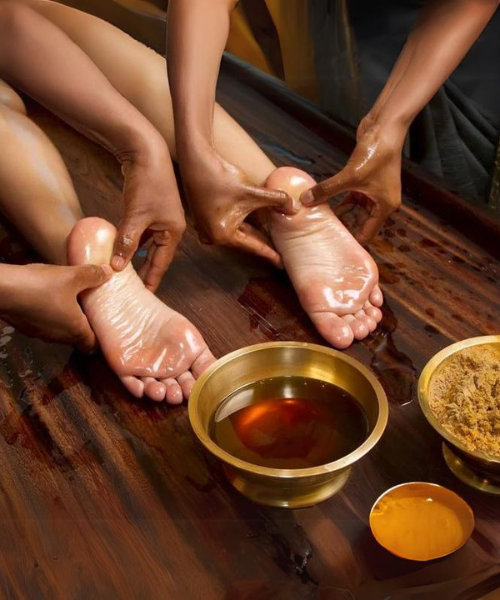
Ayurvadic


An IncrediAble Ayurveda Experience
Ayurveda is a traditional system of medicine that has its roots in ancient India. The word "Ayurveda" is derived from Sanskrit, where "Ayur" means life, and "Veda" means knowledge. Therefore, Ayurveda can be translated as the "science of life" or the "knowledge of longevity." Key principles of Ayurveda include the balance of three doshas (Vata, Pitta, and Kapha), the importance of maintaining harmony between the mind, body, and spirit, and the use of natural remedies, including herbs, diet, and lifestyle practices, to promote overall well-being.
Ayurvadic Services
A set of purification and detoxification procedures to eliminate toxins from the body. It includes therapies like Vamana (therapeutic vomiting), Virechana (purgation), Basti (enema), Nasya (nasal administration), and Raktamokshana (bloodletting).
Involves pouring a continuous stream of warm oil onto the forehead, usually over the “third eye” area. It is believed to have a calming effect on the nervous system and promote mental clarity.
The use of herbs and herbal formulations, known as Ayurvedic medicines, is a key component of Ayurvedic therapy. Specific herbs are chosen based on their properties and their effects on the doshas.
This is a form of Ayurvedic massage using warm oils, often herbal-infused, to promote relaxation, improve circulation, and balance the doshas.
Refers to various types of sweating therapies, including steam baths and herbal steam treatments, which help in eliminating toxins and balancing the doshas.
Tailoring one’s diet to their dosha constitution (Prakriti) and current state of imbalance (Vikriti) is a fundamental aspect of Ayurvedic therapy.
Contact us
Send a Message or Book Our Services
Connect with Unisoul Health for a personalized journey to well-being. Our expert team is ready to guide you through fitness, wellness, and holistic care. Reach out today to start your transformative experience.We want you experience to be a memorable one.

Massages , Therapies and many more Services
Happy Repeat Clients
Links
Timing
Working time
Monday to Sunday
10:30 AM to 09:30 PM
© Copyright 2022 by Sky Digital World








